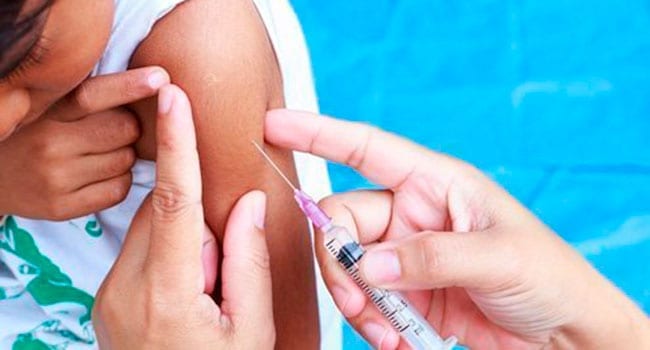 New Brunswick’s attempt to remove vaccine exemptions has sparked a political, ethical and constitutional controversy.
New Brunswick’s attempt to remove vaccine exemptions has sparked a political, ethical and constitutional controversy.
The benefits of the legislation were marginal at best, but the heavy-handed tactics used to try to implement it were even worse. Citizens beware.
“Stop the hysteria over measles outbreaks,” wrote infectious-diseases specialist Neil Rau and former Ontario chief medical officer Richard Schabas in the Globe and Mail in 2018. “Historically, virtually every child born in Canada got the measles, but with better health and nutrition, far fewer died.”
Then vaccines reduced the cases even further.
Rau and Schabas continued, “At current rates, Canada can expect to see a death from acute measles about once every hundred years or so. The borderline hysteria, fuelled by the media and public health, that greets a few cases is unwarranted.”
The authors assured readers, “Our current levels of immunization are more than adequate to achieve herd immunity,” since parental objections to vaccination in Ontario only numbered two per cent.
Seven months later, in April 2019, someone in Saint John, N.B., returned from Europe with the measles. Twelve high school students became infected. Immunocompromised students had to spend a month quarantined at home, including one who was receiving treatments for brain cancer.
None of the 12 students with measles was seriously harmed. They just went through what almost every Canadian used to – and by July everyone was over it.
Was New Brunswick under-vaccinated?
No. Government records showed objections to vaccinations were as rare in New Brunswick as they were in Ontario.
But the government couldn’t leave well enough alone. In June 2019, Education Minister Dominic Cardy introduced Bill 39 to take away parents’ rights to refuse vaccinations for their children for reasons of religion or conscience. Only medical exemptions would remain. Unvaccinated children would be forced out of public schools and into private education or home schooling.
“The road to hell is paved with good intentions,” wrote lawyer James Kitchen in a brief he submitted in opposition to the bill. “The legislative assembly of New Brunswick ought to be extremely wary of engaging in compulsion [forced vaccinations], lest it become complicit in creating a society that is no longer free and democratic.”
Kitchen cited a previous decision by Justice Gerard La Forest of the Supreme Court of Canada to show the bill was off track. In R.B. versus Children’s Aid Society of Metropolitan Toronto, La Forest acknowledged the “protected sphere of parental decision-making which is rooted in the presumption that parents should make important decisions affecting their children both because parents are more likely to appreciate the best interests of their children and because the state is ill-equipped to make such decisions itself.”
Laforest wrote that “the right of parents to rear their children according to their religious beliefs, including that of choosing medical and other treatments, is a fundamental aspect of freedom of religion.”
Ted Kuntz of Vaccine Choice Canada said that if the bill was passed, he would challenge it on constitutional grounds.
But instead of acquiescing, the government doubled down. It prorogued the legislature, then re-introduced the vaccine legislation in November 2019.
The new version, Bill 11, included the “notwithstanding clause” to prevent a court challenge, a legislative trump card rarely used. Cardy said the clause would save taxpayers court costs and would pre-empt “an organized, well-financed lobby out there that’s intent on derailing efforts to protect vulnerable children.”
Really? Which lobby was that?
Three months prior, bill opponent Terra-Lynn Coggan drew attention to the pharmaceutical lobby. Vaccine-maker Merck Canada registered 10 lobbyists, meeting with the Department of Health to “support a favourable and knowledgeable environment to implement new or improve current immunizations programs.”
The government’s use of the notwithstanding clause was frowned on by the legal community, even if they supported the goal of the bill. “New Brunswick’s vaccination bill is good public policy and probably violates rights,” wrote Kerri Froc in the Canadian Bar Association’s National Magazine last December. “That doesn’t mean the government should use the override provision.”
Six months later, a legislative committee drew the same conclusion. On June 17, 2020, MLA Chuck Chiasson moved to remove the notwithstanding clause from the legislation. It was unanimously accepted by the all-party committee. If the legislation is passed and enacted, it will almost certainly get a court challenge.
That challenge is welcomed. If Bill-39 exists to keep immunosuppressed children from having to quarantine, forget it. New Brunswick joined all the other provinces by quarantining every student (and many small business people) due to another contagious but rarely lethal condition: COVID-19.
Unfortunately, Canadians are in greater need of immunity from undue government intrusion than they are from any disease.
Lee Harding is a research fellow for the Frontier Centre for Public Policy.
Lee is a Troy Media Thought Leader. Why aren’t you?
The views, opinions and positions expressed by columnists and contributors are the author’s alone. They do not inherently or expressly reflect the views, opinions and/or positions of our publication.

